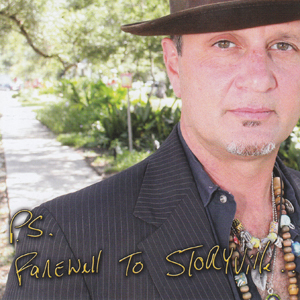 The Threadhead Records phenomenon has reshaped the profile of the local recording industry, allowing veteran musicians to make albums that might otherwise not have happened, giving deserving new artists a jump start on their careers and even producing such delightful one shots as this year’s Christmas release. No musician has benefited from this breakthrough more than Paul Sanchez, who has established himself as an important solo artist since leaving Cowboy Mouth with no small help from the label. This is the third Threadhead-financed album Sanchez has made, The Threadhead Records phenomenon has reshaped the profile of the local recording industry, allowing veteran musicians to make albums that might otherwise not have happened, giving deserving new artists a jump start on their careers and even producing such delightful one shots as this year’s Christmas release. No musician has benefited from this breakthrough more than Paul Sanchez, who has established himself as an important solo artist since leaving Cowboy Mouth with no small help from the label. This is the third Threadhead-financed album Sanchez has made,
and each has been remarkably different.
Sanchez has been preparing to make Farewell to Storyville his whole career. It’s an impromptu,
mostly solo session in which Sanchez tells stories about each song before singing it, a standard folk music format that he’s perfectly suited to. When Sanchez left his New Orleans home for New York City in the 1980s to make his mark as a songwriter at the height of the fast folk and anti-folk movements that emerged out of the city’s post-punk club ethos, he played numerous gigs that resembled this session. In fact, one of the songs here, “Breaking My Back Up Front for You Baby” was written during that period. Toward the end of his run with Cowboy Mouth, he began playing acoustic house parties that also mirrored the shape of these performances. Folk music of this type is often autobiographical and there’s no shortage of such material here. “Gonna play you some songs and tell you some stories,” he begins by way of introducing
“Knives to Grind,” a reminiscence from his childhood in the Irish Channel. “I Dreamed I Saw My Father,” a song with the feel of a Fred Neil ballad, is a bittersweet rumination on a man Sanchez says he really didn’t know. He explains how Lillian Boutté introduced him to “Farewell to Storyville,” a song about days gone by that Sanchez gives a languid reading with vocal support from Debbie Davis. The song is poignant in New Orleans today, a point Sanchez brings home by following it with “Falling with Nowhere to Land,” a post- Katrina lament. “It’s my story,” he says. “It’s our story, it’s anybody’s story that’s lived here in the last few years.” Sanchez brightens the mood with the merry Spanish language tune “Mota Mota Mota,” a reflection of his time spent in Central America after the storm. Themes of displacement, grief and plain old mental maladjustment continue to float through the album, taking different shapes. He lightens the mood, though, with the comic “Walked in the Club with Twenties” and sends everyone home smiling with the dark humor of “Enjoy Yourself, It’s Later Than You Think.” When a record like this works, you leave it feeling you’ve learned something intimate about the singer’s life, like a good conversation with a friend. Sanchez will have a lot of new friends after they listen to Farewell to Storyville.
|
No comments:
Post a Comment